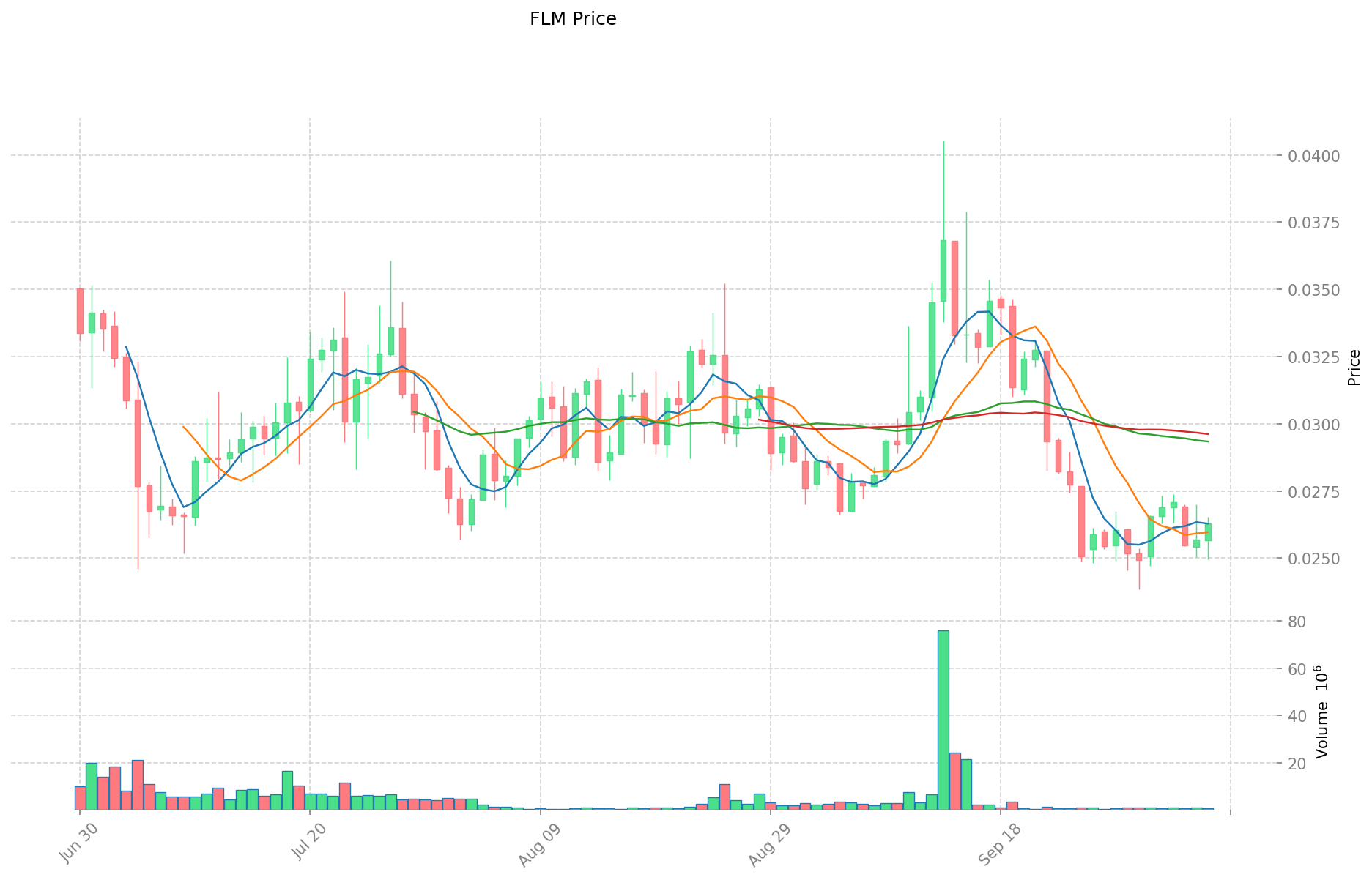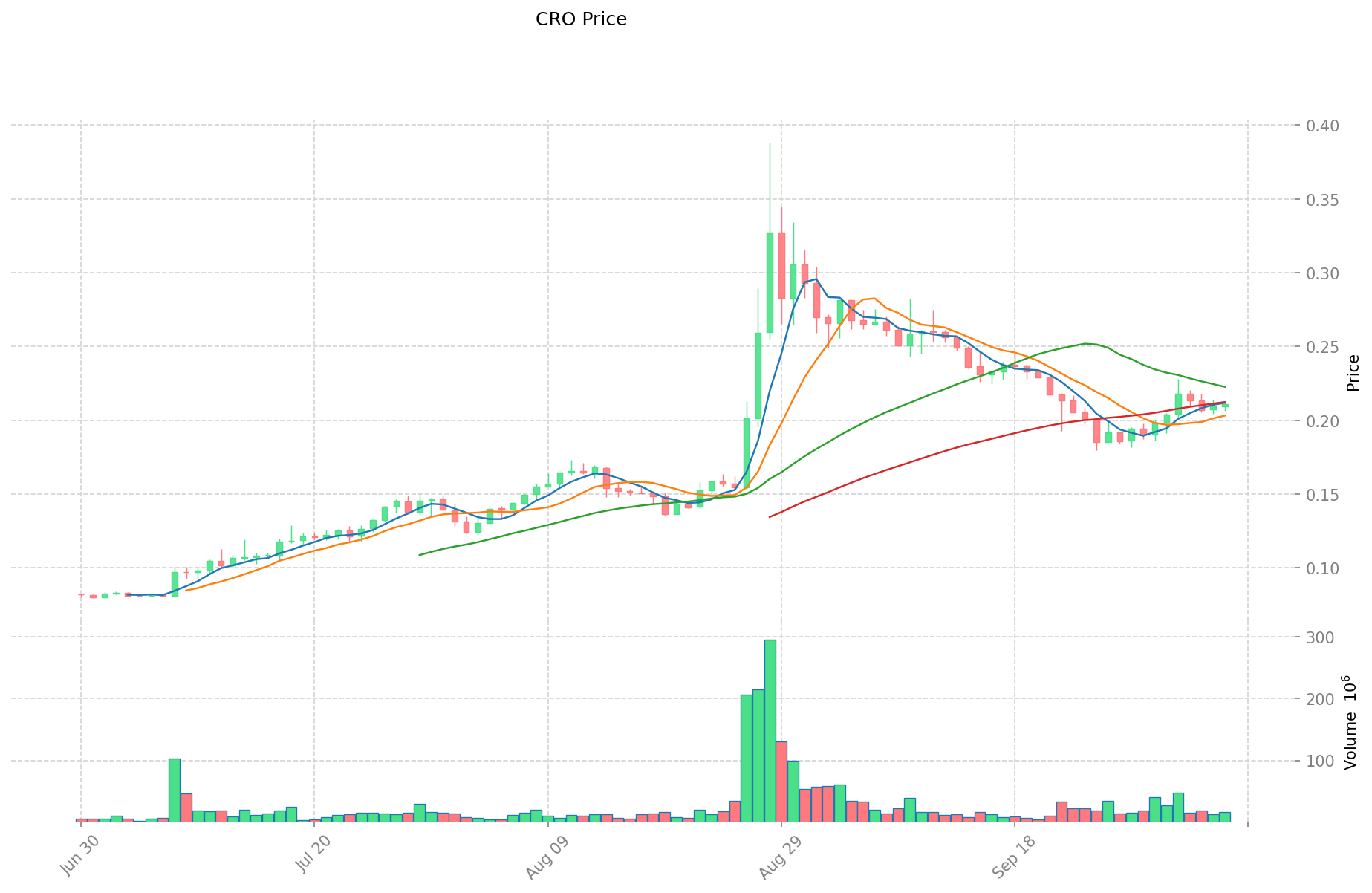FLM vs CRO: A Comparative Analysis of Digital Marketing Strategies for E-commerce Growth
Introduction: FLM vs CRO Investment Comparison
In the cryptocurrency market, the comparison between Flamingo Finance (FLM) vs Cronos (CRO) has been an unavoidable topic for investors. The two not only show significant differences in market cap ranking, application scenarios, and price performance but also represent different positioning in the crypto asset landscape.
Flamingo Finance (FLM): Launched in 2020, it has gained market recognition for its interoperability full-stack DeFi protocol based on Neo.
Cronos (CRO): Since its inception in 2018, it has been hailed as a leading blockchain ecosystem, representing one of the largest cryptocurrencies by global trading volume and market capitalization.
This article will provide a comprehensive analysis of the investment value comparison between FLM and CRO, focusing on historical price trends, supply mechanisms, institutional adoption, technological ecosystems, and future predictions, attempting to answer the question most crucial to investors:
"Which is the better buy right now?"
I. Price History Comparison and Current Market Status
Historical Price Trends of FLM (Coin A) and CRO (Coin B)
- 2020: FLM launched and reached its all-time high of $1.59 on September 28, 2020.
- 2021: CRO reached its all-time high of $0.965407 on November 24, 2021, driven by increased adoption and platform growth.
- Comparative Analysis: During market cycles, FLM has declined from its all-time high of $1.59 to its current price, while CRO has shown more resilience, maintaining a higher market capitalization.
Current Market Situation (2025-10-07)
- FLM current price: $0.02629
- CRO current price: $0.21086
- 24-hour trading volume: FLM $18,040.55 vs CRO $3,455,608.17
- Market Sentiment Index (Fear & Greed Index): 71 (Greed)
Click to view real-time prices:
- Check FLM current price Market Price
- Check CRO current price Market Price


II. Core Factors Influencing FLM vs CRO Investment Value
Supply Mechanisms Comparison (Tokenomics)
- FLM: Fixed supply model with a maximum cap, creating scarcity-based value proposition
- CRO: Deflationary mechanism with periodic token burns to reduce circulating supply
- 📌 Historical Pattern: Supply constraints have historically created price appreciation cycles during periods of increased network activity.
Institutional Adoption and Market Applications
- Institutional Holdings: CRO has gained more institutional backing due to Crypto.com's established market presence
- Enterprise Adoption: FLM demonstrates stronger potential in decentralized finance ecosystems, while CRO excels in payment processing and merchant settlements
- Regulatory Stance: Asian markets show more favorable regulatory environment for CRO, while FLM faces varying regulatory scrutiny across jurisdictions
Technical Development and Ecosystem Building
- FLM Technical Upgrades: Enhanced scalability solutions and cross-chain interoperability features
- CRO Technical Development: Expanded payment infrastructure and improved security protocols within the Crypto.com ecosystem
- Ecosystem Comparison: CRO has stronger payment integration and commercial partnerships, while FLM shows more robust DeFi protocol development
Macroeconomic Factors and Market Cycles
- Inflation Environment Performance: CRO has demonstrated better resilience during inflationary periods
- Macroeconomic Monetary Policy: Both tokens show negative correlation with rising interest rates, with CRO displaying slightly less volatility
- Geopolitical Factors: Increasing cross-border transaction demands favor CRO's established payment infrastructure
III. 2025-2030 Price Prediction: FLM vs CRO
Short-term Prediction (2025)
- FLM: Conservative $0.0207533 - $0.02627 | Optimistic $0.02627 - $0.028897
- CRO: Conservative $0.1869534 - $0.21006 | Optimistic $0.21006 - $0.2247642
Mid-term Prediction (2027)
- FLM may enter a growth phase, with an estimated price range of $0.01906847355 - $0.034753830825
- CRO may enter a stable growth phase, with an estimated price range of $0.1858873455 - $0.254372157
- Key drivers: Institutional capital inflow, ETFs, ecosystem development
Long-term Prediction (2030)
- FLM: Base scenario $0.026742997853056 - $0.038204282647223 | Optimistic scenario $0.038204282647223 - $0.039732453953112
- CRO: Base scenario $0.212533337690064 - $0.3125490260148 | Optimistic scenario $0.3125490260148 - $0.346929418876428
Disclaimer: The above predictions are based on historical data and market analysis. Cryptocurrency markets are highly volatile and subject to rapid changes. These forecasts should not be considered as financial advice. Always conduct your own research before making any investment decisions.
FLM:
| 年份 | 预测最高价 | 预测平均价格 | 预测最低价 | 涨跌幅 |
|---|---|---|---|---|
| 2025 | 0.028897 | 0.02627 | 0.0207533 | 0 |
| 2026 | 0.033927705 | 0.0275835 | 0.01544676 | 4 |
| 2027 | 0.034753830825 | 0.0307556025 | 0.01906847355 | 16 |
| 2028 | 0.038323018495125 | 0.0327547166625 | 0.021290565830625 | 24 |
| 2029 | 0.040869697715634 | 0.035538867578812 | 0.024877207305168 | 35 |
| 2030 | 0.039732453953112 | 0.038204282647223 | 0.026742997853056 | 45 |
CRO:
| 年份 | 预测最高价 | 预测平均价格 | 预测最低价 | 涨跌幅 |
|---|---|---|---|---|
| 2025 | 0.2247642 | 0.21006 | 0.1869534 | 0 |
| 2026 | 0.271765125 | 0.2174121 | 0.180452043 | 3 |
| 2027 | 0.254372157 | 0.2445886125 | 0.1858873455 | 15 |
| 2028 | 0.28939724631 | 0.24948038475 | 0.204573915495 | 18 |
| 2029 | 0.3556592364996 | 0.26943881553 | 0.1428025722309 | 27 |
| 2030 | 0.346929418876428 | 0.3125490260148 | 0.212533337690064 | 48 |
IV. Investment Strategy Comparison: FLM vs CRO
Long-term vs Short-term Investment Strategies
- FLM: Suitable for investors focused on DeFi ecosystems and potential growth in decentralized finance
- CRO: Suitable for investors seeking stability and exposure to a broader cryptocurrency ecosystem
Risk Management and Asset Allocation
- Conservative investors: FLM: 20% vs CRO: 80%
- Aggressive investors: FLM: 40% vs CRO: 60%
- Hedging tools: Stablecoin allocation, options, cross-currency portfolios
V. Potential Risk Comparison
Market Risk
- FLM: Higher volatility and susceptibility to DeFi market trends
- CRO: Exposure to overall cryptocurrency market sentiment and Crypto.com platform performance
Technical Risk
- FLM: Scalability, network stability
- CRO: Centralization concerns, potential security vulnerabilities
Regulatory Risk
- Global regulatory policies may impact both differently, with CRO potentially facing more scrutiny due to its wider adoption and payment focus
VI. Conclusion: Which Is the Better Buy?
📌 Investment Value Summary:
- FLM advantages: Strong potential in DeFi ecosystems, interoperability features
- CRO advantages: Established market presence, broader ecosystem integration, payment infrastructure
✅ Investment Advice:
- New investors: Consider a higher allocation to CRO for its established ecosystem and relative stability
- Experienced investors: Balanced approach with exposure to both, leveraging FLM's DeFi potential and CRO's ecosystem strength
- Institutional investors: Focus on CRO for its institutional backing and payment infrastructure, with selective exposure to FLM for DeFi diversification
⚠️ Risk Warning: The cryptocurrency market is highly volatile, and this article does not constitute investment advice. None
FAQ
Q1: What are the key differences between FLM and CRO? A: FLM is a DeFi protocol on Neo, focusing on interoperability and decentralized finance. CRO, associated with Crypto.com, has a broader ecosystem including payment infrastructure and merchant settlements. CRO has a larger market cap and trading volume, while FLM offers potentially higher growth in the DeFi sector.
Q2: Which coin has performed better historically? A: CRO has shown more resilience in maintaining its value compared to FLM. CRO reached its all-time high of $0.965407 in November 2021, while FLM's all-time high was $1.59 in September 2020. Currently, CRO trades at a higher price and has a significantly larger trading volume.
Q3: What are the supply mechanisms for FLM and CRO? A: FLM has a fixed supply model with a maximum cap, creating scarcity-based value. CRO employs a deflationary mechanism with periodic token burns to reduce circulating supply. Historically, these supply constraints have led to price appreciation during periods of increased network activity.
Q4: How do institutional adoption and market applications differ between FLM and CRO? A: CRO has gained more institutional backing due to Crypto.com's established market presence. It excels in payment processing and merchant settlements. FLM demonstrates stronger potential in decentralized finance ecosystems but faces varying regulatory scrutiny across jurisdictions.
Q5: What are the price predictions for FLM and CRO by 2030? A: For FLM, the base scenario predicts a range of $0.026742997853056 - $0.038204282647223, with an optimistic scenario of up to $0.039732453953112. For CRO, the base scenario predicts $0.212533337690064 - $0.3125490260148, with an optimistic scenario up to $0.346929418876428. However, these predictions are subject to market volatility and should not be considered financial advice.
Q6: How should investors allocate their portfolio between FLM and CRO? A: Conservative investors might consider allocating 20% to FLM and 80% to CRO, while more aggressive investors could opt for a 40% FLM and 60% CRO split. New investors may want to focus more on CRO for its established ecosystem, while experienced investors might balance exposure to both coins.
Q7: What are the main risks associated with investing in FLM and CRO? A: FLM faces higher volatility and is susceptible to DeFi market trends, with technical risks including scalability and network stability. CRO is exposed to overall cryptocurrency market sentiment and Crypto.com platform performance, with potential centralization concerns. Both face regulatory risks, with CRO potentially facing more scrutiny due to its wider adoption and payment focus.
Share
Content